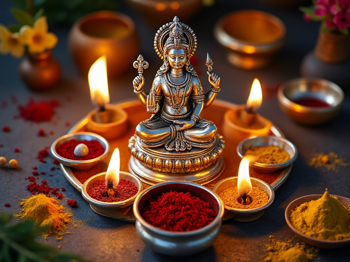Gauri Puja holds deep spiritual and cultural significance, particularly for married women who pray for the long life and prosperity of their husbands. The festival is also significant for unmarried women, who worship Goddess Gauri to find an ideal life partner. It is believed that Goddess Gauri, being the embodiment of virtues and prosperity, blesses her devotees with strength, courage, and the fulfillment of their desires. The festival is also seen as an opportunity to honor and celebrate womanhood and the nurturing aspect of femininity.
- Blessings for a Happy Married Life: Performing Gauri Puja is believed to ensure the well-being and longevity of one’s spouse, fostering a harmonious marital relationship.
- Prosperity and Wealth: Devotees seek the blessings of Goddess Gauri for prosperity, wealth, and material abundance in their lives.
- Success and Fortune: The puja is considered auspicious for achieving success in endeavors and bringing good fortune.
- Protection and Strength: Goddess Gauri is worshipped for strength, protection from evil forces, and overcoming challenges in life.
- Fulfillment of Desires: Unmarried women perform this puja with the belief that Goddess Gauri will help them find a suitable life partner and fulfill their wishes.
Performing Gauri Puja is a sacred and cherished ritual in Hinduism, particularly in regions like Maharashtra, where it is often associated with the celebration of Ganesh Chaturthi. Gauri Puja is dedicated to Goddess Gauri, who is considered a manifestation of Parvati. Here is a step-by-step guide to performing Gauri Puja:
Preparation
-
Clean the Puja Area:
- Ensure the area where the puja will be performed is clean and well-organized.
- Place a clean cloth or a fresh piece of cloth (known as a "pavitra") on a flat surface to act as the puja platform.
-
Gather Puja Materials:
- Idols or images of Goddess Gauri
- Fresh flowers
- Incense sticks (agarbatti) and a holder
- Oil lamp (diya) and ghee or oil
- Water (in a small vessel)
- Offerings such as fruits, sweets (like laddu or modak), and raw milk
- A small bell
- A conch shell (optional)
- Kumkum (red powder) and haldi (turmeric powder)
- A plate or tray to hold the offerings
- A clean cloth for offering
Performing the Puja
-
Establish a Sacred Space:
- Light the oil lamp and place it in front of the deity’s idol or image.
- If you have a conch shell, blow it gently to signify the start of the puja.
-
Prepare the Puja Thali:
- Arrange the offerings (fruits, sweets, etc.) on the plate or tray.
- Keep the water vessel, kumkum, and haldi ready.
-
Perform Ganesh Vandana (Optional):
- If desired, start with Ganesh Vandana, as Ganesh is considered the remover of obstacles. Offer prayers to Lord Ganesh before proceeding with Gauri Puja.
-
Invoking the Deity:
- Sprinkle a few drops of water around the puja area to purify it.
- Offer a prayer to invite Goddess Gauri into the space and to bless the proceedings.
-
Offer Flowers and Water:
- Gently place fresh flowers at the feet of the deity's idol or image.
- Sprinkle a little water over the idol as a form of purification.
-
Apply Kumkum and Haldi:
- Apply a small amount of kumkum and haldi to the idol or image of Goddess Gauri.
- You can also apply these powders to your own forehead as a mark of devotion.
-
Perform Aarti:
- Hold the oil lamp in your hand and perform aarti (a ritual of waving lighted lamps) in front of the idol or image.
- Sing or recite aarti songs dedicated to Goddess Gauri.
-
Offer Naivedya (Food Offerings):
- Present the prepared sweets, fruits, and other food items to the deity.
- Offer a small portion of these offerings as "naivedya" and then share the rest with the family.
-
Conclude the Puja:
- Ring the bell and offer your final prayers to Goddess Gauri.
- Thank the deity for her blessings and seek her grace.
-
Distribute Prasad:
- After the puja is complete, distribute the prasad (sacred food) among the family members and guests.
-
Clean Up:
- Carefully clean the puja area and properly dispose of any used materials.
Additional Tips
- Dress Modestly: Wear clean, traditional clothing to show respect during the puja.
- Be Sincere: The most important aspect of any puja is the devotion and sincerity with which it is performed.
- Follow Local Traditions: Customs might vary based on regional and family traditions, so consider incorporating any specific practices relevant to your tradition.
Performing Gauri Puja with devotion and adherence to rituals is believed to bring blessings and prosperity.




